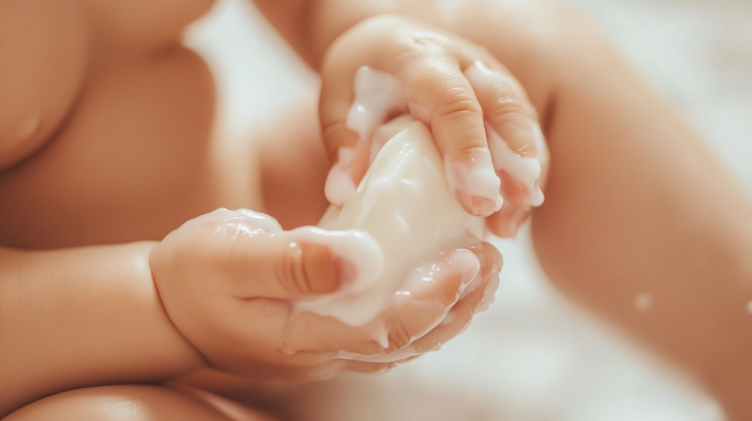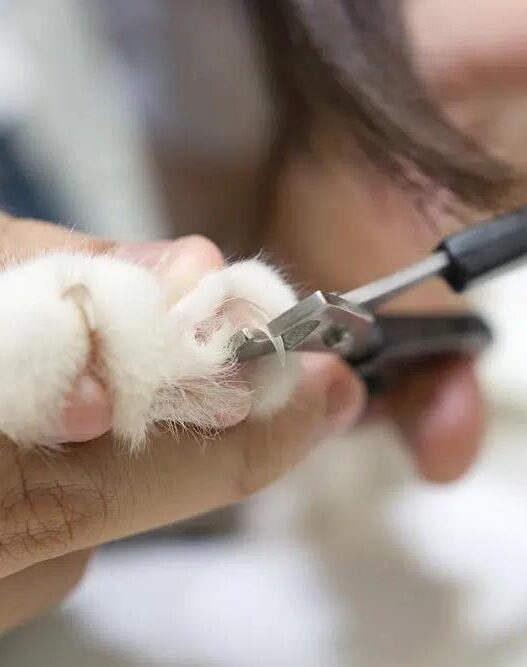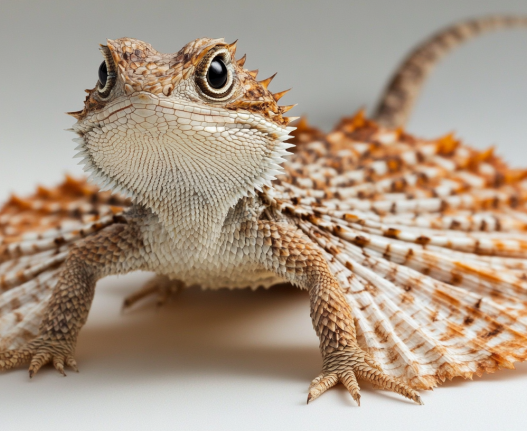When a baby is born, in addition to the love and care from mom, one of the initial challenges is dealing with baby skin issues.
Among these, eczema is something many new parents experience.
Eczema is no small issue. It can cause your baby discomfort from itching and pain, which can be heartbreaking for moms.
Today, let’s explore what eczema really is, how to help your baby’s skin heal, and share some essential baby skincare tips.
What Is Eczema? The “Cunning Enemy” of Your Baby’s Skin
Eczema, also known as atopic dermatitis, is a common skin condition, particularly prevalent in babies aged 0-1 years.
You may notice red spots, dry skin, peeling, or your baby scratching because of itching.
Don’t worry, eczema is not a major disease. It is a skin allergic reaction triggered by an underdeveloped immune system.
A baby’s skin is naturally more fragile, making it more susceptible to eczema due to environmental stimuli.

Common Triggers of Eczema:
- Environmental Changes: Dry or excessively humid air, extreme temperatures.
- Skin Allergens: Materials in clothing, fragrances, detergents, pollen, etc.
- Baby’s Constitution: Babies with sensitive skin or a family history of allergies are more prone to eczema.
- Dietary Factors: For breastfed babies, improper diet choices by the mother or allergies triggered by certain foods when introducing solids can cause eczema.

Symptoms of Eczema: Small Red Dots and Big Trouble
Eczema typically begins on a baby’s face, neck, behind the ears, and the joint areas of the limbs, especially behind the knees and elbows.
The symptoms often include: red spots, dryness, peeling, scabbing, and blisters.
As eczema persists, the skin becomes drier, itchier, and scratching can worsen the condition.
Common Symptoms of Eczema:
- Red rashes, especially on the face, neck, elbows, and knees.
- Dry, rough skin that looks cracked.
- Itching, with the baby often scratching, which may lead to skin damage and infections.
- Peeling and scabbing as the eczema heals.

What to Do About Baby Eczema? Essential Skincare Tips for Moms
Although eczema is common, it can have lasting effects on your baby’s skin health.
Therefore, it is essential to take timely action once your baby shows symptoms of eczema.
Here are some effective skincare tips to help manage eczema and become an eczema “terminator”!
1. Keep Skin Clean and Moisturized
Eczema most commonly occurs on dry skin. Therefore, it’s vital to keep your baby’s skin clean and moisturized.
During bath time, avoid hot water and harsh soaps. Opt for gentle, non-irritating skincare products.

Key Tips:
- Warm Water Bath: Ensure the water temperature stays between 36-37°C (97-98.6°F) to avoid irritating your baby’s skin with water that is too hot or cold.
- Gentle Care: Use baby bath products that are fragrance-free and additive-free, and avoid using adult soaps or body wash.
- Moisturize: After the bath, apply fragrance-free, alcohol-free moisturizing cream, especially on areas prone to eczema.
2. Choose Clothes Carefully
When choosing clothes for your baby, consider soft, breathable fabrics. Avoid tight or rough clothing, as these can irritate eczema-prone skin.
Cotton is a great choice because it’s gentle and breathable. Wash new clothes before your baby wears them to remove any residual chemicals or irritants.
Also, avoid using harsh detergents or fabric softeners, as they can trigger eczema.

3. Control the Environment
The environment plays a huge role in eczema flare-ups.
- Humidity: If the air is too dry, use a humidifier in the baby’s room to keep the air moist and prevent skin from drying out.
- Temperature: Keep the room temperature moderate, as extreme heat or cold can worsen eczema symptoms.
- Allergens: Try to minimize exposure to allergens like dust mites and pet dander, which can also trigger eczema.

4. Apply Topical Treatments
For more severe eczema cases, topical treatments may be necessary.
- Hydrocortisone cream or other corticosteroid-based medications can help reduce inflammation and itching.
- Prescription creams like tacrolimus may also be used for more severe cases. However, these should only be used under the guidance of a healthcare provider.
- Always follow the doctor’s instructions when applying topical treatments, as overuse can have side effects.

5. Be Aware of Food Triggers
If your baby has food allergies, they may play a role in eczema flare-ups.
Some common allergens that may trigger eczema include milk, eggs, peanuts, and shellfish.
If you suspect food allergies are involved, talk to your pediatrician about the possibility of testing for allergies or eliminating certain foods from your baby’s diet.

6. Avoid Scratching
Scratching the skin can cause further damage, increase irritation, and potentially lead to infection.
To prevent scratching, keep your baby’s nails trimmed short. You can also put soft mittens on your baby’s hands to limit scratching, especially during sleep.

7. Consult a Doctor
If your baby’s eczema persists despite home care or worsens, it’s important to consult a pediatrician.
They may recommend additional treatments such as prescription medications, and they can also guide you in managing eczema long-term.

Conclusion: Eczema is Manageable with the Right Care
While dealing with eczema can be challenging, it’s important to remember that with the right care, most babies can heal and manage the condition effectively.
The key is to keep the skin moisturized, avoid triggers, and follow your pediatrician’s guidance. With the right treatment and care, your baby can overcome eczema and have healthy, happy skin.



















